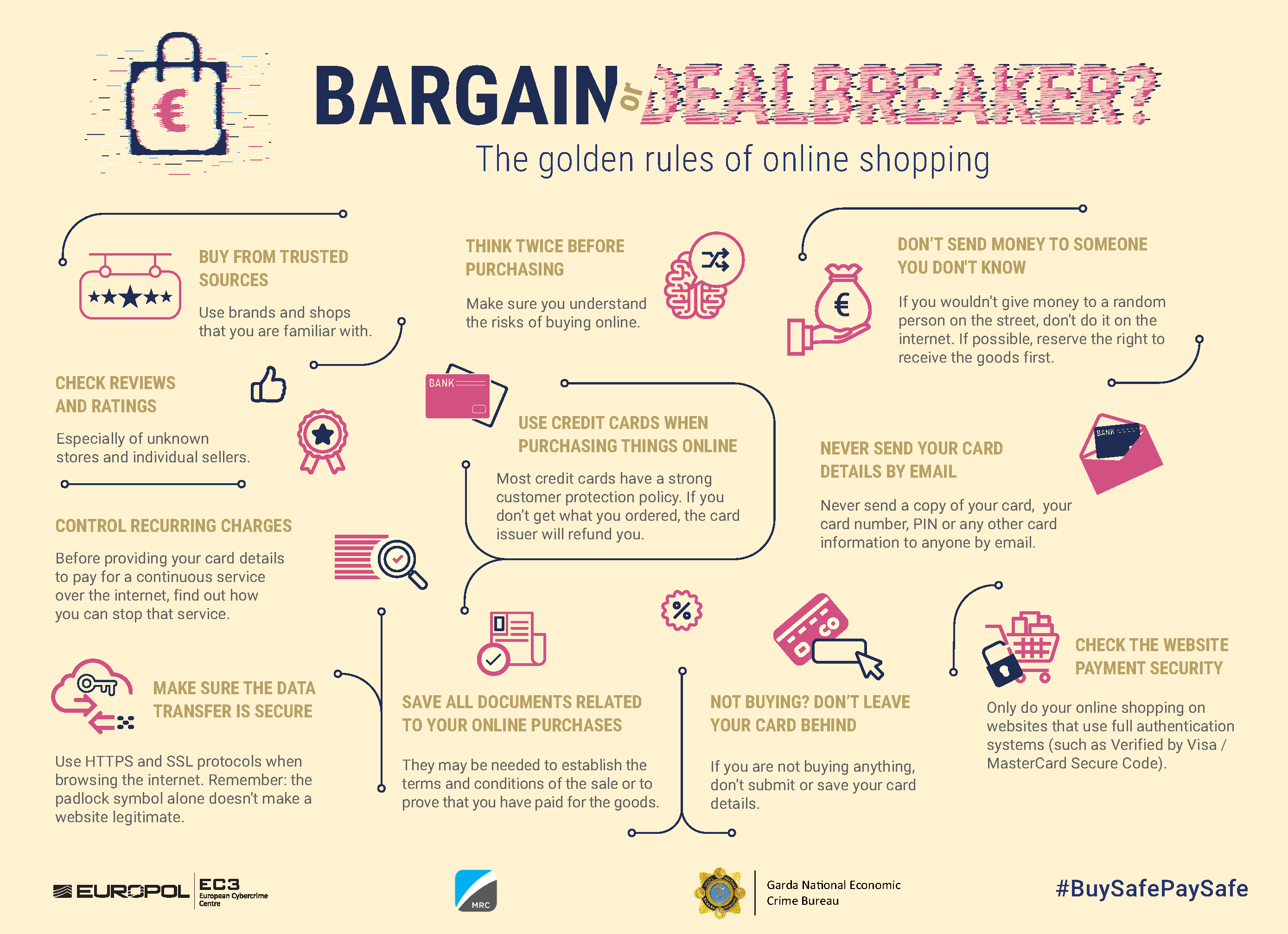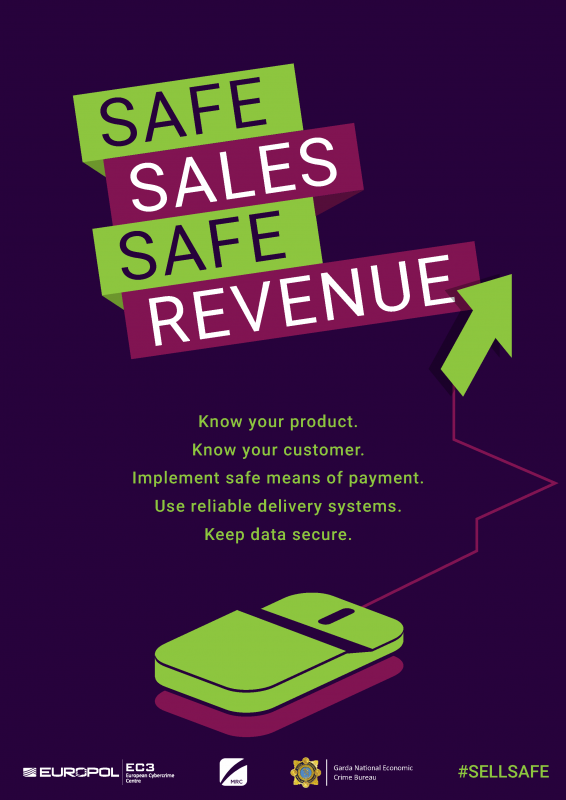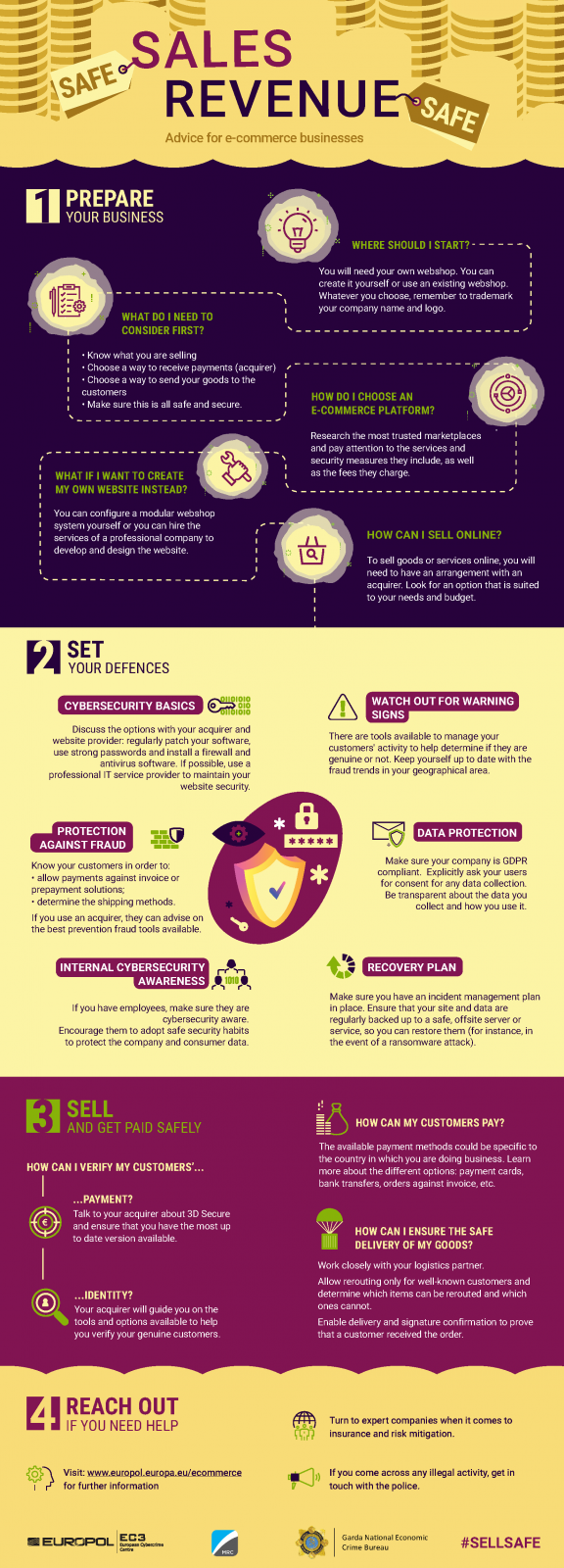You may also be interested: Revenue Warns Shoppers of Additional Costs
An Garda Síochána wish to support Europol in a Europe wide campaign to promote safe online shopping during the Christmas season and beyond from the perspective of consumers and of businesses.
In the period from 1st January 2020 until 31st October 2020, 489 Online Shopping Frauds have been reported to An Garda Síochána. The average loss was €2,306 per incident representing an overall loss to Irish citizens of €1,127,972.
The business community are frequently targeted by fraudsters using stolen or compromised credit cards, bank accounts or payments, in what is called Card Not Present Fraud. Businesses who are victims of this fraud will suffer losses under the ‘charge back’ process.
In the first 10 months of 2020, 346 Card Not Present Frauds have been reported to An Garda Síochána in Ireland 2020 to date, representing an average loss of €1,083 or a total of €374,751.
As we enter this busy season, consumers and businesses will be particularly active online and An Garda Síochána and Europol advise consumers to follow the golden rules for online shopping.
The Golden Rules:
- Buy from trusted sources.
- Understand risk and think twice before purchasing.
- Check the seller’s reviews and ratings.
- Ensure data transfer is secure.
- Save all documents related to online purchases.
- If you don’t make a purchase, don’t leave identity or card details behind.
- Check the website payment security.
- Never send card details by email, text or other messaging methods.
- Don’t send money to someone you don’t know – check first.
- Use credit cards when purchasing online.
#BuySafePaySafe
See further details at https://www.europol.europa.eu/eCommerce
Businesses are warned to protect their sales and revenues by identifying risks: know their product, know their customers, utilise safe means of payment and use reliable delivery methods. Consumers and businesses must protect their personal data during transactions other than the normal data required to complete a transaction. This site provides advice on all aspects of online shopping.
#SellSafe
Online Shopping Fraud in Ireland
Examples – Consumers – Online Shopping Fraud
A 69-year-old male from Co. Laois purchased a JCB online for €15,000. The JCB was not delivered as requested. A website had been set up to advertise machinery from a fake company.
A 24-year-old female from Kerry purchased two tickets via Facebook. Money was transferred online through AIB online, directly to the account of the seller. The two concert tickets have not been received and the seller can’t be contacted. Fake identity used to open the bank account.
A 52-year-old female from Leitrim was buying a present for a child and found a Playstation Pro 4 on an online trading forum. She engaged with the seller through the messaging app on the forum and transferred €240 to a bank account. The Playstation never arrived and the seller has gone offline and will not reply to messages.
Examples – Businesses – Card Not Present Fraud
A bank account was compromised and the account details were used to book an overnight stay in a hotel in Galway to the value of €342.00. The holder of the account was refunded by the bank. This cost may be placed with the hotel, who accepted the account details, in the charge back process.
A female was informed by her bank that a fraudulent transaction had occurred on her debit card for €70.00 at a business premises. Her card number, expiry date and security number had been identified by a fraudster. The bank or the business will suffer this loss.
An online gift company identified a transaction to the value of €3,008 and became suspicious. Having carried out checks, the company stopped the transaction and returned the money to the bank. No loss was suffered.
Europol Release:
The biggest retail season of the year is around the corner, and you do not even need to leave the comfort of your home to participate.
But neither do the criminals.
Easy website design, increased social media traffic, and convenience have made buying and selling online products a pillar of the modern shopping experience. The COVID-19 pandemic has driven even more consumers to turn online to make purchases. For businesses, this trend poses both challenges and significant opportunities. More sales and more traffic all mean more revenue. But it also means more fraud as criminals have even more opportunities to steal from both consumers and merchants. So how should retailers be prepared?
#SellSafe awareness campaign
Through an awareness campaign launching today, law enforcement across 16 countries have teamed up with Europol’s European Cybercrime Centre (EC3) and the Merchant Risk Council to share practical advice on how to outwit criminals trying to abuse the online shopping experience.
This awareness campaign is being conducted under the umbrella of the 2020 e-Commerce Action (eComm 2020) led by Europol and the Austrian Criminal Intelligence Service (Bundeskriminalamt). This year’s campaign has a special focus on e-merchants, helping them better identify fraud on their platforms and empowering them to take steps to protect their business and customers against such attacks.
Law enforcement as well as key retail partners will share the messages of the campaign using the #SellSafe hashtag to reach the widest possible audience.
The threat posed by these criminals is very real: in the lead up to this campaign, a number of countries carried out operational actions which resulted in the arrest of 22 such e-fraudsters in the month of October alone.
Edvardas Šileris, Head of Europol’s European Cybercrime Centre (EC3) said:
Peak season for cybercriminals and fraudsters is just around the corner. Often, businesses will not realise they have processed a fraudulent transaction until weeks or even months later. This is why e-commerce fraud is so dangerous – by the time all parties involve realise, it can be too late to find the criminal. That is why prevention is the best solution. Europol is working with its partners from policing and the private sector in this eComm2020 action to protect businesses and customers from such attacks.
Bernhard Schafrath, Detective at the Austrian Criminal Intelligence Service, said:
Over the years, high street retailers have taken comprehensive measures to protect their businesses against theft, burglaries and the like. In the 21st century, online businesses need to take similar measures to protect themselves against threats such as fraud, phishing and parcel mules. The awareness campaign launched today draws on the experience of law enforcement investigations against fraudulent orders of various kinds, and aims to help merchants better recognise and address the security gaps on their platforms.
How to protect your e-business:
Taking your business online to the e-commerce world is a big step. There are a number of simple measures you can take to #SellSafe. Europol’s European Cybercrime Centre has put together some pointers to get you started:
- Know your product: some products are riskier to sell than others. For example, selling easily resalable small items that are already in demand is riskier than personally designed items.
- Know your customer: If you accept card payments and ship valuable goods to your customers, you would want to know who you are sending the items to, wouldn’t you?
- Establish a safe means of payment: Your card processor can advise you. Choosing a safe means of payment will limit the risk of fraud.
- Use a reliable delivery service: choose a delivery method where you can be sure of the professional handling of your merchandise and possible non-delivery dispute claims.
Find more tips on how to protect yourself and your business from e-fraudsters here.
More general advice on how to shop safely online is available here.
Want to get €5, absolutely free? Sign up to the ‘Smart’ Debit Card – Curve today, and earn a fiver on us! Find out more here.



